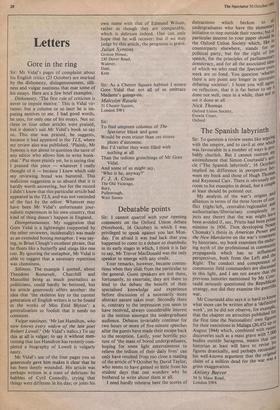Letters
Gore in the ring
Sir: Mr Vidal's pages of complaint about his English critics (23 October) are marked by the dishonesty, disingenuousness, silli- ness and vulgar nastiness that mar some of his essays. Here are a few brief examples.
Dishonesty. 'The first rule of criticism is never to impute motive.' This is Vidal vir- tuous: but a column or so later he is im- puting motives to me. I had good words, he says, for only one of his essays. Not so: three or four other articles were praised, but it doesn't suit Mr Vidal's book to say so. This one was praised, he suggests, because it had appeared in the TLS, where my review also was published. 'Plainly, Mr Symons is not about to question the taste of any editor who allows him to write book- chat.' Put more plainly yet, he is saying that I praised this piece — whatever I really thought of it — because I knew which side my reviewing bread was buttered. This malicious suggestion is so absurd that it is hardly worth answering, but for the record I didn't know that this particular article had appeared in the TLS, and was not reminded of the fact by the editor. Whatever may have been Mr Vidal's unfortunate jour- nalistic experiences in his own country, that kind of thing doesn't happen in England.
Disingenuousness. My suggestion that Gore Vidal is a lightweight (supported by the other reviewers, incidentally) was made as an extended boxing metaphor. I was say- ing, in Brian Clough's excellent phrase, that he floats like a butterfly and stings like one too. By ignoring the metaphor, Mr Vidal is able to suggest that a necessary repetition was clumsiness.
Silliness. The example I quoted, about Theodore Roosevelt, Churchill and Mussolini being as much journalists as politicians, could hardly be bettered, but his article generously offers another: the idea that 'the skeleton key to the current generation of English writers is to be found in the works of Miss Enid Blyton': a generalisation so foolish that it needs no comment.
Vulgar nastiness. 'Mr Ian Hamilton, who now knows every widow of the late poet Robert Lowell.' (Mr Vidal's italics.) To say this at all is vulgar; to say it without men- tioning that Ian Hamilton has recently com- pleted a biography of Lowell is vulgarly nasty.
Mr Vidal's use of the four pages you so generously gave him makes it clear that he has been deeply wounded. His article was perhaps written in a state of delirium: he babbles of Cyril Connolly, crying that things were different in his day; or joins his own name with that of Edmund Wilson, rather as though they are comparable, which is delirium indeed. One can only hope that he will recover: but if we may judge by this article, the prognosis is grave.
Julian Symons
Groton House, 330 Dover Road, Walmer, Deal, Kent










































 Previous page
Previous page